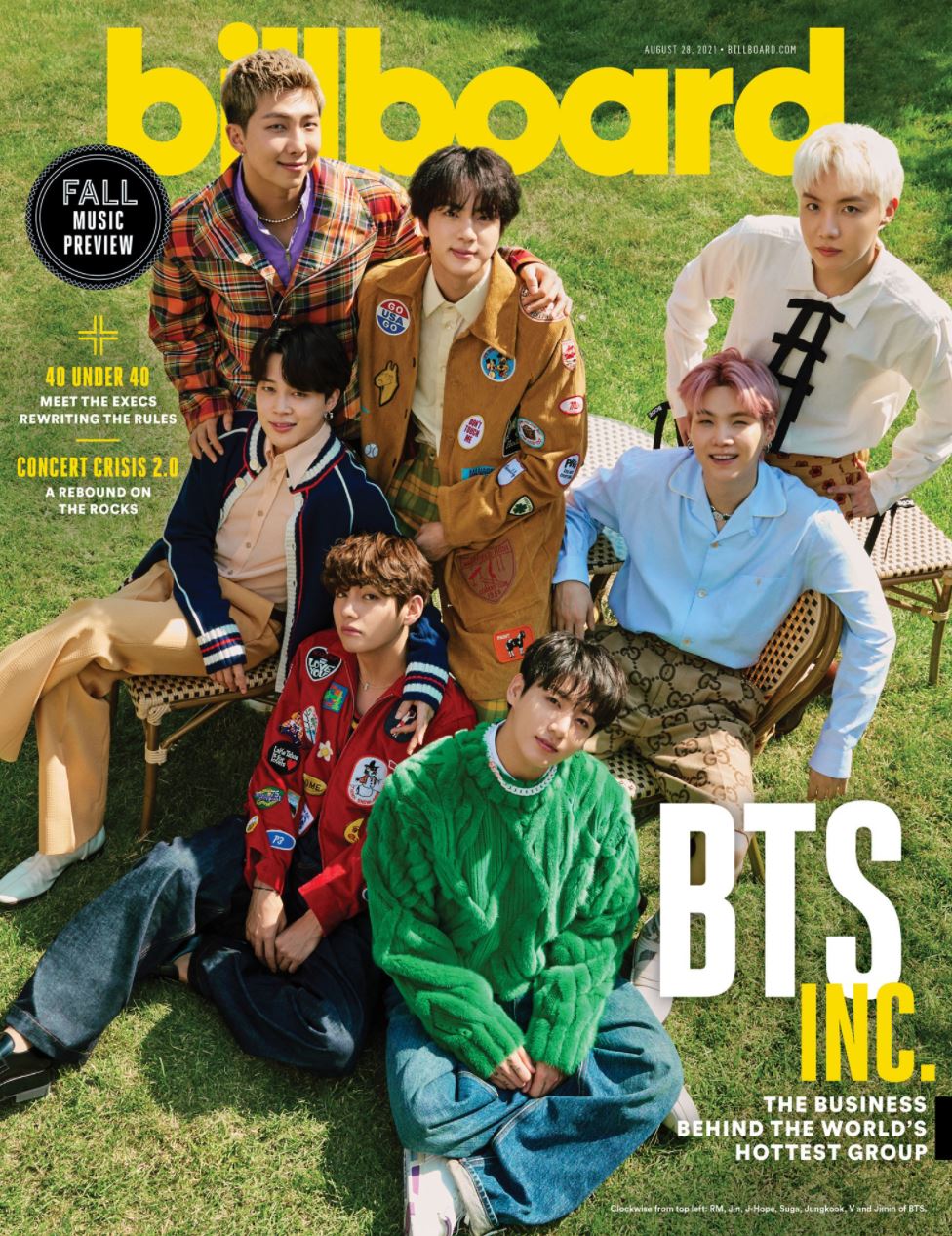BTS covers Billboard



No other artist this year has spent as much time on the top of Billboard Hot 100 as BTS with their back-to-back hits “Butter” and “Permission to Dance”. After reading their new Billboard cover feature in the new issue of the magazine… I’m not sure Billboard is all that happy about it?
Billboard functions as both an industry insider publication and a go-to resource for the general public on all things music. So this piece attempts to profile BTS as artists for a greater audience and analyse their success from a business perspective. And the timing, probably, isn’t accidental, as we’re approaching Grammy nomination season; the band received its first nomination last year – and are hoping to build on that history.
This is standard operating procedure for artists heading into award season. And the way it usually works is that a feature like this, in Billboard or Variety or Rolling Stone or whatever, is intended to reach voters, to make the case for the music and its value. By now everyone knows this game. Which is why the tone of this particular feature article on BTS in Billboard feels off-game, as there’s a lot here that actually undermines and even challenges BTS’s legitimacy and popularity.
Several paragraphs of the piece are dedicated to whether or not BTS and their label have been manipulating the charts, the implication being that their string of number one hits, and their domination of the Billboard Hot 100 has been artificially achieved – because their powerful fanbase, ARMY, mobilises better than practically any other collective in digital spaces to spend as much money as possible on BTS’s music.
But the thing is, all this is above-board. ARMY has actually put in the work to understand what counts towards success on Billboard’s charts, and with that knowledge, they’ve galvanised as a team to meet the criteria, drive sales and streaming, and propel their idols to the top. It’s totally legal, by the Billboard book.
So for Billboard, in their own article, to be judging BTS for playing by the rules that Billboard themselves set for artists, I don’t know that it makes a lot of sense. It’s like if the inventor of Scrabble started accusing the all-time Scrabble champion for learning the entire dictionary backwards and forwards. BTS’s leader, RM, said as much during the interview:
“It’s a fair question,” says RM of allegations that ARMY’s work amounts to chart manipulation. “But if there is a conversation inside Billboard about what being No. 1 should represent, then it’s up to them to change the rules and make streaming weigh more on the ranking. Slamming us or our fans for getting to No. 1 with physical sales and downloads, I don’t know if that’s right ... It just feels like we’re easy targets because we’re a boy band, a K-pop act, and we have this high fan loyalty.”
Well, exactly. Billboard is complaining about BTS gaming their system – but they came up with the system, and BTS isn’t finding loopholes in the system, they’re actually adhering to the system! If you don’t like your own f-cking system, then you fix it, don’t go around blaming the people who have used it to great success.
Is this really about BTS winning at the Billboard system, or is it about WHO Billboard wants to see winning at their system? If Taylor Swift was doing the same thing as BTS (and Billboard’s recent rule changes were made because Taylor Swift and other artists were bundling merchandise along with music and counting that towards chart performance – which is NOT what BTS does, all their sales numbers are music-based and have to do with different version of their songs, so it tracks back to the actual art and not sweatshirts and hoodies), would Billboard be interviewing Taylor Swift and accusing her of cheating the system?
F-CK NO.
That’s what RM is getting at here when he says that it feels like they’re “easy targets”. Because we all know, if Billboard did manage to score an interview with Taylor Swift or Adele or Justin Bieber or any of the top-selling western artists, they wouldn’t dare put that conversation topic on the table.
So it comes to whose music is taken seriously through a western lens, even when the person behind the lens isn’t white. It’s about how the status quo in popular music is maintained by gatekeepers who uphold a west-first superiority and anyone can be conditioned in that default. BTS, because they’re a boy band, because they didn’t come from the western music infrastructure, because their fans are stereotyped as lower value, because the fans are assumed to be young (not true) and predominately female, is still not taken seriously by these western institutions – if they were, they wouldn’t continuously have to be questioned about the legitimacy of their success.
And this is not that I think journalists should be sycophants. Journalists should challenge artists, they should not avoid controversial subjects. So I’m not saying there shouldn’t have been space in this piece to get into that territory with BTS. But with context.
One of the main reasons BTS’s ARMY is so committed to understanding chart requirements and then using their knowledge to organise sales initiatives among the fandom is because of how BTS has been historically ignored by the traditional media that has been a resource for western and English-language artists to amplify their music. For a long time, despite interest and appeals from BTS’s fans, radio stations, television shows, magazines, and other pop culture media outlets ignored BTS, even though they had the talent and the numbers to back it up. Even now, for all their achievements, as we have seen, there are media personalities who still make racist jokes, television personalities who still dismiss them, programmers who brush them aside.
BTS’s fans have long been exposed to the xenophobia and exclusionary tactics of cultural gatekeepers – so their efforts to promote and support the band are rooted in feeling excluded by extension. BTS and ARMY were left out of the game, so they decided to play the game better than the game’s designers, and beat them at it.
This Billboard article then, and its focus on chart manipulation, misses this critical piece of information – and it’s crucial to the story. You want to talk about ARMY’s activities? Fine. But if you’re going to criticise ARMY’s mission to invest every dollar they can into BTS, you first must understand why ARMY was compelled to figure out the market and master it. And while you’re at it, you must as well turn that critical lens onto the market itself, and how it has always marginalised those who weren’t raised in the program.
Now that would have been an interesting conversation with the band, talking to them about an industry and all its ancillary connections (like Billboard and the media) that is not inclusive, and now being part of a company, as BTS is with their label HYBE, that actually has bought into that system, with HYBE’s acquisition of Scooter Braun’s Ithaca Holdings this year and what impact their influence might make on changing, literally, the complexion of the business – in other words they were outsiders who can now be insiders, revolutionaries who could become reformers.
This, to me, is a more interesting angle to explore that isn’t jumping up the artists’ asses for a puff piece. And it also relates to their art. Because the closest that this Billboard profile comes to getting objectively real with BTS is on the subject of releasing three English-language singles in less than a year. In the past, they’ve insisted on putting out music in Korean and succeeding on those terms.
The pandemic, though, restricted their ability to travel with their music and put their personalities and performance abilities behind the songs that were written in their own language. RM admits to Billboard that he was one of the band members who wasn’t entirely convinced that they should be releasing English songs, but conceded that “there was no alternative”. Apparently the band members were split on this issue, although they all eventually, as we know now, ended up compromising. Billboard notes that BTS and their representatives didn’t want to elaborate any further on this but I’m also wondering whether or not they were reluctant to go there because they already had a bad taste in their mouths from the line of questioning about chart manipulation.
If the discussion about charting and industry exclusionism related to creative freedom though, and acceptance, perhaps the conversation would have gone differently. Because as both a fan and a member of the media, myself, that’s been my curiosity about BTS…
While they have been known over the last year for music that’s meant to bring people together, to uplift and energise, they started as outsiders, a scrappy group from a nascent label who sang and rapped about cultural hypocrisy, socioeconomic disparity, mental health, and youth apathy. Their songs could be gritty and sarcastic, sometimes morose, sometimes angry. The most recent version of that aggression came through on the song “UGH”, off the album Map of the Soul: 7. The last album, BE, released last year, after months of the pandemic, was meant to be a soother, a meditation on loneliness and isolation.
So from a creative standpoint, given the space they now occupy as both outsiders and insiders, in the push pull between revolution and reform, how does that inform their artistic expression now as they navigate the unique position they’ve found themselves in? Getting higher up the summit than they could have ever imagined, and yet still being challenged by those who insist on managing the mountain about whether or not they deserve to be there – where do they channel that experience? Where do they find the edge? And…are we about to get a taste of it when they release new music? In Korean? Or English?
Artists from Bob Dylan to Jay-Z to Taylor Swift to Lorde have had to unpack those questions, and I wish it could have been the same in this case with BTS. That would have been a conversation rooted in contextual curiosity rather than an agenda of suspicion about BTS’s fans. But if we’re back on that tip, Billboard is talking out of both sides of their mouth, because while questioning BTS’s accomplishments by side-eying their fans, Billboard is also doing the most to profit from BTS being on their cover, shooting the band as a collective with all seven members, but then also releasing solo covers featuring RM, Jin, Suga, j-hope, Jimin, V, and Jungkook individually, hoping to get some of that ARMY money. It kind of undermines the argument that fans are manipulating numbers when you yourself try to drive up your numbers by lubing up those same fans.
But BTS has probably moved on. They have other priorities. Like the release of the “Butter” remix featuring Megan Thee Stallion which just dropped today after Megan filed court documents against her label. Is Billboard going to bitch about this too?

